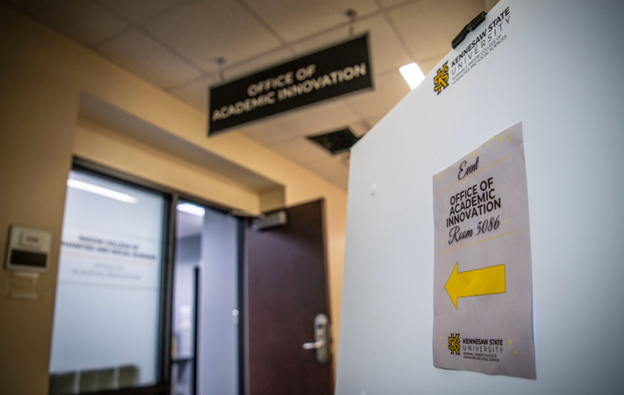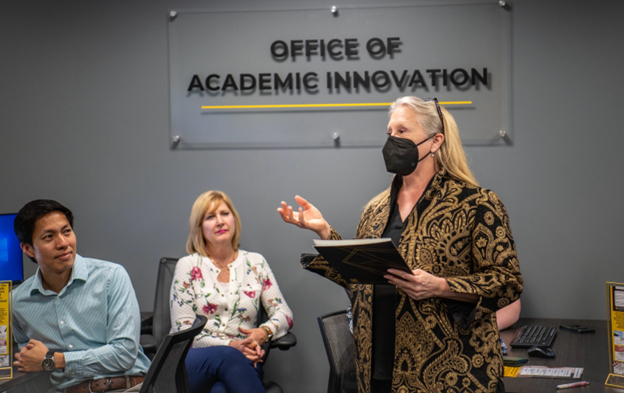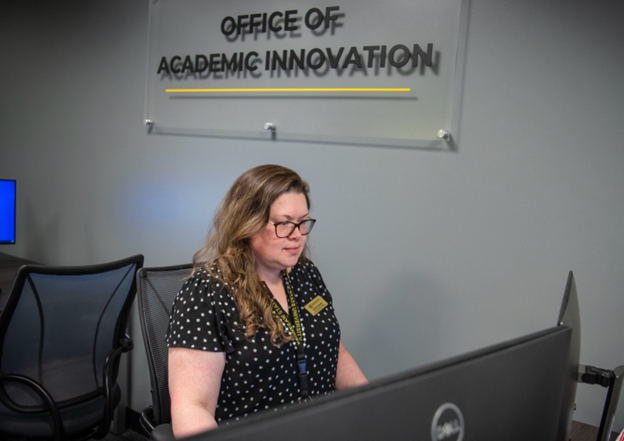Norman J. Radow College Launches Office of Academic Innovation, Ushering in Intentional Application of Evidence-Based Learning
Last week marked a milestone for the Norman J. Radow College of Humanities and Social Sciences as it unveiled its pioneering Office of Academic Innovation (OAI). This visionary resource will enhance student learning through evidence-based approaches in the humanities and social sciences disciplines.
KENNESAW, Ga. (Apr 19, 2024) — by: James R. Turner

The OAI represents a dynamic culture where exploration and experimentation flourish.
Faculty members will continue to be empowered to venture into uncharted territories
of educational methods, craft innovative curriculum, and harness the latest tools
and technologies for student support. This continues Radow College’s commitment to
active engagement in academic advancement by ensuring that the OAI's initiatives continuously
evolve to meet the ever-changing needs of faculty and students.

"As the pace of change in the world accelerates, so must our approach to education," remarked Katie Kaukinen, Ph.D., Dean of the Norman J. Radow College. "The Office of Academic Innovation will be the standard-bearer for providing students with the most effective and engaging learning experiences. By expanding access to evidence-based practices, we empower them to instill a love for learning in our students and continue to equip them with the necessary skills to excel in a world that demands critical thinking and innovation."
To commemorate OAI’s launch, the college hosted an open house on April 11th on the 5th floor of the Social Sciences building, Room 5086, where the office is located. The event was an opportunity for faculty, staff, and students to explore the comprehensive roadmap laid out by the OAI that includes three key pathways:
- Exploration and active participation in cutting-edge educational methods facilitated by faculty collaboration, support, and development initiatives. These include a faculty fellow program tailored to address specific needs, speaker series, workshops, and the inaugural Student Success Summit planned for May 13, 2024, which taps into the expertise of faculty in fostering student success.
- Engagement in teaching and learning through innovative curriculum designs, student support tools, and educational research to support students in achieving their academic, personal, and professional goals.
- Pursuit of entrepreneurial and workforce readiness pathways, including credentialing
avenues, to equip students for diverse career opportunities both here and abroad.

The success of the OAI's mission hinges on collaboration. The college continues to
seek to harness the expertise of its faculty and foster partnerships in the broader
community. Collaborations and endowments from with workforce partners such as Merlin
Wealth Management, which resulted in a series of financial education micro-credentials,
underscore the OAI's commitment to preparing our students not just their first job
after graduation, but to arm them with valuable, transferable skills that are applicable
in any career.
In addition to offering micro-credentials to enhance student learning experiences,
the OAI offers a range of opportunities for faculty to hone their own skills, and
develop tools and teaching strategies that can be incorporated into curriculum, opportunities
such as:
- Opportunities to continue to pursue, develop and implement innovative teaching tools and approaches, such as toolkits for success for use in the classroom as well as providing layers of support grounded in research that faculty can employ in their classes.
- Workshops and training sessions on how to incorporate active learning strategies, leverage technology, and design effective curricula.
- Faculty fellowships to support focused development of cutting-edge educational methods refined through faculty support, analysis, and evaluation.
- A dedicated space for faculty to serve as a hub for collaboration, ideas exchange,
and sharing best practices to foster a culture of innovation.
"We are committed to continuous improvement and student success," emphasized Kristina DuRocher, Ph.D., Associate Dean of Academic Affairs. "Through this until we will continue to foster a culture of exploration and innovation to enhancing student learning, developing and supporting practices and educational opportunities that will shape the future of learning."
With three schools and eight departments that serve nearly 8,000 students, Radow College offers over 80 programs of study across the humanities and social sciences. For more information please visit: https://radow.kennesaw.edu/academic-innovation/ and for additional information on the educational opportunities available at Radow College, please visit: https://radow.kennesaw.edu/











